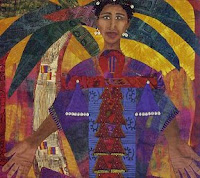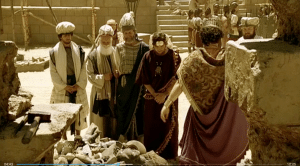The six chapters in this week’s reading covers twenty eight years. Mormon labels most of these years as either ones of contention and dissension or peace and prosperity. Keeping track of the timeline can be tricky. It can also be challenging to locate the more spiritual passages among the year-to-year descriptions. To help you out in your preparations, I’ve created an outline of Helaman 1-6, a list of the spiritual passages, and a summary of suggested discussion topics.
Outline of Helaman 1-6
If you want to provide your class with a handout, I also made a printable version of this outline. The numbers in brackets give the chapter and verse reference.
- contention and dissension
- 40th year [Helaman 1:1]
- Pahoran, Paanchi, and Pacumeni all want to be chief judge [1:3]
- Pahoran won, Paanchi starts rebellion and was condemned to death [1:8]
- Kishkumen killed Pahoran and the dissenters kept it secret [1:11]
- Pacumeni is appointed chief judge [1:13]
- 41st year [1:14]
- Lamanites led by Nephite dissenter Coriantumr fight Nephites in Zarahemla (in the heart of the Nephite lands) [1:15-18]
- Pacumeni died in the fighting [1:21]
- Coriantumr marched toward Bountiful, but Nephites cut them off and Coriantumr died in the battle [1:30]
- Lamanites were surrounded and left Nephite lands [1:31-33]
- 42nd year
- Helaman was appointed as chief judge [2:2]
- Gadianton becomes leader of Kishkumen’s band [2:4]
- Servant uncovers plot to kill Helaman and the servant kills Kishkumen [2:5-9]
- Gadianton’s band fled to wilderness [2:11]
- 40th year [Helaman 1:1]
- peace and prosperity
- 43rd-45th years
- No contention for a few years [3:1-2]
- 43rd-45th years
- contention and dissension
- 46th year
- so much contention that people were moving to the land northward. [3:3]
- Many who moved were Ammonites (anti-nephi-lehi, lamanite by birth) [3:12]
- 47th-48th years
- more contention [3:19]
- Helaman ruled with justice and equity [3:20]
- He had two sons: Nephi and Lehi {3:21]
- 46th year
- peace and prosperity
- 49th year
- peace, except Gadianton establishes secret combinations [3:23]
- Tens of thousands join the church [3:26]
- 50th-52nd years
- peace, but pride [3:32-36]
- 53rd year
- Helaman died, Nephi is chief judge [3:37]
- 49th year
- contention and dissension
- 54th year
- many dissensions in church [4:1]
- Rebels go to the Lamanites, but the Lamanites don’t want to go to war [4:3]
- 56th year
- rebel Nephites successful in persuading Lamanites to prepare for war all year [4:4]
- 57th to 59th years
- battles, Nephites driven out of Zarahemla and southern lands [4:5-8]
- 60th and 61st year
- Moronihah and Nephites won back about half of their lands [4:9-10]
- 54th year
- peace and prosperity
- 62nd year
- Nephites stop trying to get the rest of their lands, worried the Lamanites will overpower them [4:18]
- Nephites recognize their wickedness [4:22]
- Nephi gives up judgment seat to Cezoram. [5:1]
- Nephi and Lehi remember what their father Helaman taught them [5:5-13]
- Nephi and Lehi preach to Nephites, Lamanites, and Nephite dissenters [5:16-17]
- Eight thousand Lamanites in Zarahemla were baptized [5:19]
- Nephi and Lehi taken prisoner in the land of Nephi, encircled by fire that doesn’t burn them, earth trembles, there is darkness, and all hear a still voice calling for repentance [5:21-34]
- Aminadab (one of the Nephite dissenters) recognizes that Nephi and Lehi were conversing with angels and that they should repent [5:35-45]
- They hear a voice whispering ‘peace’ and angels minister. The three hundred who were there convince most of the other Lamanites to lay down their weapons of war and give the land back to the Nephites [5:46-52]
- 63rd year
- Lamanites and Nephi and Lehi go to preach in the northern lands [6:6]
- Nephites and Lamanites can freely go among all the lands [6:7-8]
- 64th and 65th years
- Very prosperous, peace, women make cloth [6:9-14]
- 62nd year
- contention and dissension
- 66th year
- Cezoram and his son were murdered [6:15]
- 67th and 68th years
- wicked, Lamanites try to remove Gadianton robbers but Nephites unite with them [6:16, 20-21, 37-39]
- 66th year
List of Spiritual Passages
These passages focus less on history narrative and more about values, faith, repentance, and miracles. My top picks for passages to discuss in class are in bold.
- 3:24-30 Mormon talks about the gate of heaven being open to all
- Many Nephites were baptized, but their conversions don’t seem to be very deep because just five years later there are many dissentions in the church (Hel. 4:1).
- 3:33-35 pride enters “not into the church of God, but into the hearts of the people who professed to belong to the church of God”
- ”people within the church are part of the problem in this society…Pride leads to social hierarchies, divisions, and harming certain groups poses a great evil.”* (Salleh & Hemming, 2023, pp. 10–11)
- 4:11-16 Discuss sins, pride, repentance
- 4: 20-26 Nephites are scared and see their imperfections. They see that they are like their brethren the Lamanites
- “The orthodox Nephites now see their own wickedness…While they make this crucial step toward recognizing their own responsibility in their conflict and their need to change, they do not take the next step of removing themselves from comparison with the Lamanites. By describing their own spiritual journey by contrasting themselves to others , they reinforce the foundational failure of their society: an incessant desire to create hierarchies and social divisions.” (Salleh & Hemming, 2023, pp. 13–15)
- 5:5-13 Things Helaman wants his sons Nephi and Lehi to remember: build foundation on the rock of our Redeemer
- 5:17 dissenters immediately endeavor to repair wrongs they had done
- 5:21-52 Nephi and Lehi cast into prison, miraculously not burned by fire, prison shaking, darkness, mild voice whispers repentance and peace
- Many Lamanites were baptized because of this experience. It was a deep conversion because five years later they are removing the Gadianton robbers from their society.
- “Peace comes to us from the Lord, but we can help each other feel that peace as we share our burdens and our happiness.” Blessed by Living Water, by Kathleen H. Hughes, April 2003.
- this could be a good story to act out if you have a younger class
- 6:11-13 Flourishing society. The Book of Mormon mentions women–it’s a miracle!
- 6:20-21, 37-39 Lamanites try to remove Gadianton robbers but Nephites unite with them
Suggested Discussion Topics
So what should you cover in your class? The passage Helaman 1-6 gives you more choices than many lessons. If there is a particular conversation you want to have with your class, you could choose one or two of the stories to focus on. You could compare and contrast the Nephite conversion story in Hel. 3:24-30 to the Lamanite conversion story in Hel. 5:21-52. What were both groups doing five years later? You could talk about the overarching story of conflict and peace and ask how these scriptures relate to our current times (although you may need to be prepared to smooth over some political differences). If you have a younger class, the story about Nephi and Lehi in prison would be fun to act out. If you have an engaged adult class, you might let the class members guide the discussion and start by asking what parts stood out to them.
A diagram of the “pride cycle” is at the beginning of the lesson in the church’s manual. Pride as used in the Book of Mormon means having excessive self-esteem and not relying on God. Even when the Nephites recognize their wickedness in Hel. 4: 20-26, they still compare themselves to the Lamanites. Excessive comparison and pride are related attributes. The Nephite’s pride cycle is an unhealthy pattern that we don’t want to follow. This could be contrasted with ideas from Janette C. Hales’ April 1991 talk “A Pattern of Righteousness”. She said:
“A pattern of righteousness is worthy of duplication, yet there are those who suppose that our righteousness involves climbing some imaginary vertical ladder. We then think we hasten our progress by trying to get above or ahead of others. I believe this is pride. . . . Righteousness is reproduced horizontally, not vertically. When we establish a pattern of righteousness in our lives, we commit to our Heavenly Father to do all in our power to help others reproduce this pattern in their lives. This can happen over and over until, as it says in Isaiah, ‘the inhabitants of the world will learn righteousness.’ (Isa. 26:9.)”
I like to end my lessons by talking about how our discussion relates to Jesus. In your lesson, that might be how Jesus is the foundation of faith, how following Jesus example brings peace, or how repentance is possible due to the atonement.
*Salleh, F. S., & Hemming, M. O. (2023). The Book of Mormon for the Least of These, Volume 3.










3 Responses
Thank you for this! I’ve been trying to figure out how to approach this lesson, and this is so helpful!
These chapters feel like a totally different puzzle than most lessons. I’m glad you found this helpful!
I agree with Cate Thank you for this